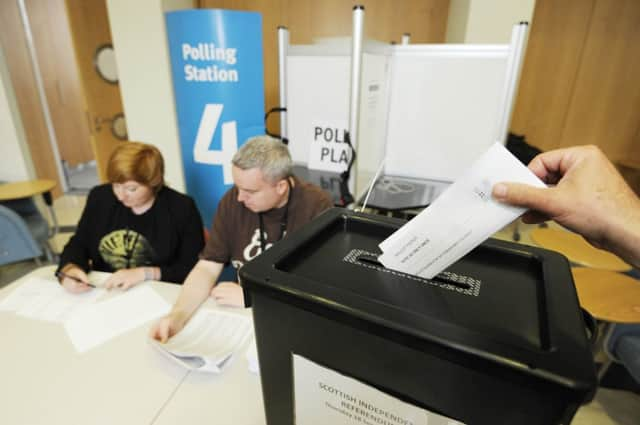Leaders: Cameron could join the teenage fanclub


The case for allowing these teenagers to vote has long been an overwhelming one. A 16-year-old can leave school, get a job, pay taxes, get married, have children, join the armed forces, in fact almost everything that every other citizen aged 18 or over can do – except vote for a government or a local council.
If they are trusted with all these rights and responsibilities, why on earth can they not be trusted to use the right to vote responsibly?
Advertisement
Hide AdAdvertisement
Hide AdThe fact that they can, of course, be so trusted was recognised at last year’s independence referendum. All the evidence is that they took the privilege seriously, engaged in the debate and with the arguments, and voted in huge numbers according to their own conclusions about the issue just as responsibly as everyone else did.
So now the UK government is to recognise that and Scottish 16 and 17-year-olds will be able to vote at the Scottish Parliament elections in 2016 and presumably at local authority elections as well. But the UK government is not legislating to allow them, or teenagers in the rest of Britain, the same privilege at the next general election due in May.
Why could that be? After all, the Westminster air is thick with talk of this now being a zombie parliament with next to nothing to do. Debating and legislating on this issue would be an extremely good use of this otherwise wasted parliamentary time.
Perhaps it is because the Conservative party is alone amongst the major parties in not supporting such a move. To say they oppose it would perhaps be too strong – David Cameron tends to say that he cannot see an overwhelming reason for changing the status quo.
Could it be that he fears that the Labour and Liberal Democrat parties, but not the Tories, would benefit at the ballot box? It seems the most likely explanation, but if it is, it is rather a short-sighted one.
Gaining electoral advantage was one reason that many people believed the SNP was in favour of extending the franchise at the referendum. Surveys have consistently shown that younger people were more likely to vote SNP than older generations. But analysis of results suggest that 16- and 17-year-olds voted, albeit fairly narrowly, against independence.
And surely, since Mr Cameron has tried his best to show that the Tories are a rather more progressive political force than their opponents depict them, seizing the initiative on lowering the voting age would be an extremely good piece of evidence to prove the Tories’ claim to modernity. We need young people to engage in the political process, it is for the benefit of everyone, and having a vote is required for that.
‘Action’ call for Scottish films
Scottish Screen was merged with the Scottish Arts Council to form Creative Scotland with many fine words about how the new body would promote excellence and quality in all cultural and artistic forms, and be leaner and fitter for the job than the two predecessor bodies.
Advertisement
Hide AdAdvertisement
Hide AdActually, say Scotland’s producers of film, it has turned out to be none of these things as far as cinematic art is concerned. Making films can involve expensive buildings such as studios, which necessitates involving Scottish Enterprise and, according to the film-makers, getting a business and an arts quango to collaborate has proved impossible. And although Creative Scotland has a director of film and has a published strategy for encouraging it, not much money to support productions has come out of it.
Let’s be frank, merging the two arts bodies five years ago had little to do with enhancing achievement in any art form, and a lot to do with meeting manifesto commitments to cull quangos and save some money. Since film (quite wrongly) tends to rank below theatre, the written word, and painting in most people’s estimates of Scottish artistic excellence, it was odds-on that it would suffer in the way the producers say it has.
The lack of priority given to film cannot be because its output is second-rate. The list of successful films, screen actors, and directors that Scotland has produced is too long to list here. And it brings an economic bonus that few other art forms can boast of – tourists trekking to the locations of their favourite movies.
The producers have made a good case for an agency dedicated to supporting them. Politicians should be listening and taking notes.